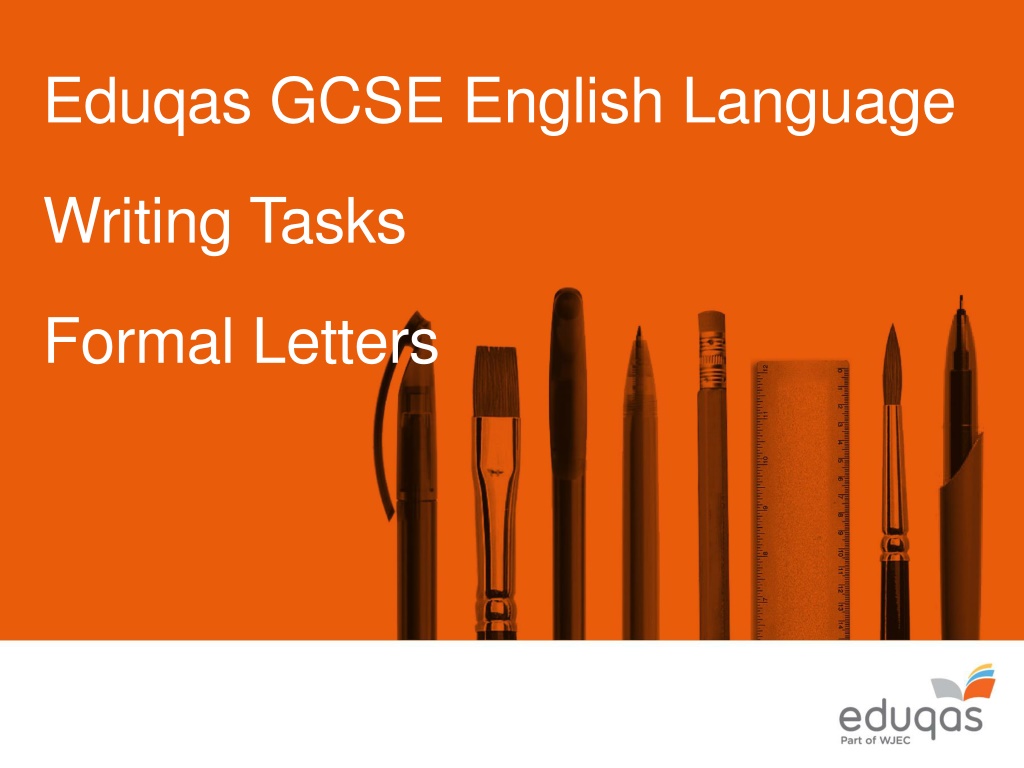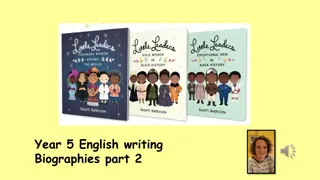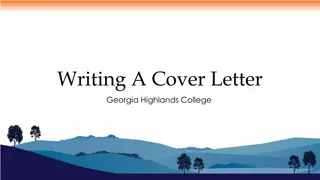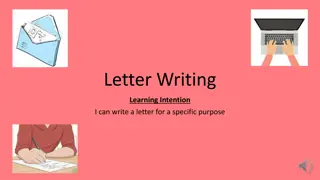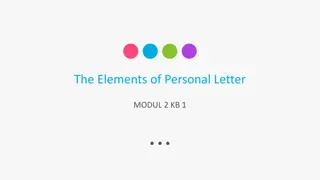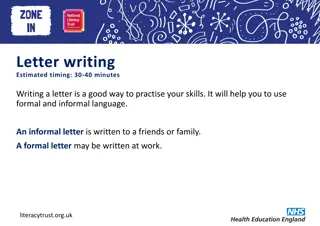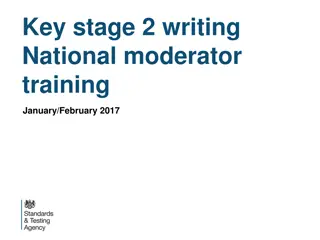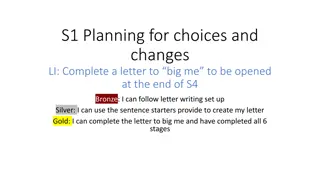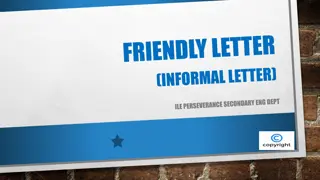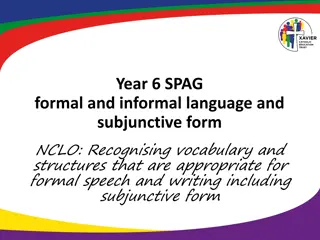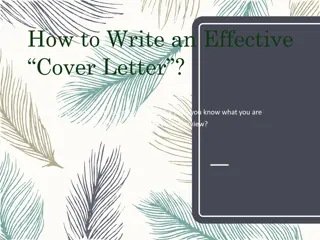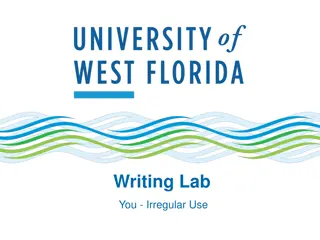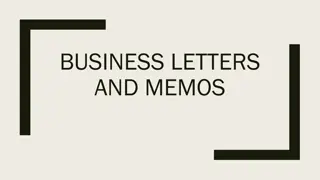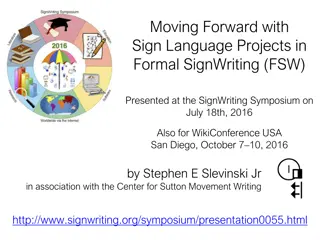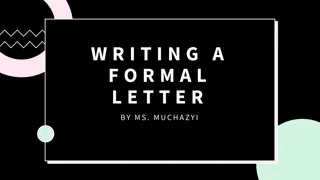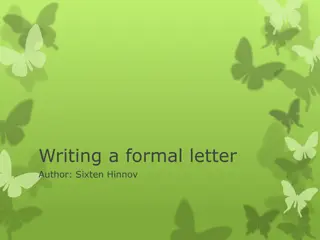Mastering Formal Letter Writing: Tips and Examples for Success
Explore the art of formal letter writing with this comprehensive presentation covering the fundamentals of planning, content, features, and layout. Learn how to address the audience, define the purpose, structure your letter effectively, and craft the right tone. Discover essential tips for opening and closing a formal letter, and access sample plans and marked examples for guidance. Elevate your writing skills and ensure your formal letters make an impact.
Download Presentation

Please find below an Image/Link to download the presentation.
The content on the website is provided AS IS for your information and personal use only. It may not be sold, licensed, or shared on other websites without obtaining consent from the author. Download presentation by click this link. If you encounter any issues during the download, it is possible that the publisher has removed the file from their server.
E N D
Presentation Transcript
Eduqas GCSE English Language Writing Tasks Formal Letters
Aims of this presentation introduce formal letter writing discuss features of formal letter writing revisit previous formal letter writing tasks share tips and look at how to write a successful formal letter consider sample plans and extracts provide full marked examples link to a revision sheet on formal letter writing
Letter writing: how to plan What do you need to know? Audience Who are you writing for/to? Think about what you need to consider when writing to this person. Purpose What is your writing trying to achieve? For example, you may need to do one of the following: - - - - give information express an opinion persuade someone make someone do something
Letter writing: how to plan Content What are the main points you want to make? Think about whether they are consistent and the order you want to present them in. Register What is the appropriate tone for your writing? In a formal letter you would need to be polite but there is still room to consider whether you are aiming for a specific tone. For example, are you aiming for forceful or reasonable; will your tone include gentle humour or more biting sarcasm? Format What do you need to know about layout? There are specific rules for formal letter writing. Do you know them? Pay careful attention to the next few slides if you are unsure.
Features: layout The way you set out a formal letter is important and there are clear rules to follow. Look at the example below: In an exam you may wish to indicate where the addresses would go on your page, rather than writing them out in full. In a real life situation, it is important that you know how to do this properly and write out all addresses in full.
Features: layout Opening and closing a letter: The way you start a letter affects which ending you choose. Keep in mind the following: Opening Closing Tips If you don t know the name of the recipient. E.g. Dear Sir/Madam, You should end with: Look carefully at: - the use of commas - whether capital letters are used or not Yours faithfully, Dear Sir/Madam, Yours faithfully, If you know the name of the recipient. E.g. Dear Mr Hollings, You should end with: Look carefully at: - the use of commas - whether capital letters are used or not - the spelling of sincerely Yours sincerely, Dear Mr Hollings, Yours sincerely,
Features: layout Opening statement: Make sure you give a clear opening sentence to establish your views: E.g. - I am writing in support of your proposal to use Fairtrade products in the school canteen. - I understand that you are considering a change to the timings of the school day. I am wholly in support of this proposal. - Your newspaper recently published an article describing plastic as one of the biggest problems faced by our planet. I wholly agree with this statement for a number of reasons
Features: layout Concluding statement: Make sure you end clearly. You should be formal and sum up your arguments in a convincing way. E.g. - It is clear that the school has a moral imperative to consider adopting these proposals. - I am convinced that a change to the school day will result in a happier and healthier learning environment. - In conclusion, I would like to thank you for drawing attention to the crisis we are facing. It is only by increasing awareness of this issue that real change will occur.
Formal letter writing tasks Examples of past exam tasks: The text below was part of an article in a teenage magazine: I m fed up of reading about celebrities and sports stars behaving badly. They do no good and a lot of harm. The worst thing is that teenagers are easily influenced to think they can copy them and behave the same. Write a letter to the magazine giving your views on the subject. This is part of a letter that appeared in a newspaper: I can t understand why we have pets. They can be expensive to look after, they take up lots of time, children want them then get tired of them, yet if you dare to say you would never have a pet, people think you are strange. I would never have one. Write a letter to the newspaper giving your views on this subject. Your headteacher has decided that there should not be an end of year celebration such as a school prom or party. The headteacher believes it would just be an excuse for students to show off in an expensive way. Write a letter to your headteacher giving your opinions on this. It has been suggested that reduced-price bus fares for young people should be scrapped to save money, but that free travel for over 65s should continue. Write a letter to your local newspaper giving your views on this proposal.
Getting to grips with formal letter writing Your headteacher has decided that there should not be an end of year celebration such as a school prom or party. The headteacher believes it would just be an excuse for students to show off in an expensive way. Write a letter to your headteacher giving your opinions on this. [20] To help you plan a response to this question, can you answer the following questions? Question Do you agree or disagree with this statement? Make a list of the reasons that you agree or disagree. Who is the audience for your letter? What tone will you use?
Getting to grips with formal letter writing Your headteacher has decided that there should not be an end of year celebration such as a school prom or party. The headteacher believes it would just be an excuse for students to show off in an expensive way. Write a letter to your headteacher giving your opinions on this. [20] The questions that you answered for the previous slide will help you to create a plan for this task. You can use this template to help. A sample plan can be seen on the next slide.
Formal letter writing sample plan Your headteacher has decided that there should not be an end of year celebration such as a school prom or party. The headteacher believes it would just be an excuse for students to show off in an expensive way. Write a letter to your headteacher giving your opinions on this. [20]
Formal letter writing sample extract Your headteacher has decided that there should not be an end of year celebration such as a school prom or party. The headteacher believes it would just be an excuse for students to show off in an expensive way. Write a letter to your headteacher giving your opinions on this. [20] Look at the opening paragraphs to this answer then look back at the plan on the previous page. Can you see how the plan has helped the student to write this answer?
Formal letter writing sample plan Your headteacher has decided that there should not be an end of year celebration such as a school prom or party. The headteacher believes it would just be an excuse for students to show off in an expensive way. Write a letter to your headteacher giving your opinions on this. [20]
Formal letter writing sample extract Your headteacher has decided that there should not be an end of year celebration such as a school prom or party. The headteacher believes it would just be an excuse for students to show off in an expensive way. Write a letter to your headteacher giving your opinions on this. [20] Look at the middle section to this answer then look back at the plan on the previous page. Can you see how the plan has helped the student to write this answer?
Formal letter writing sample answer It has been suggested that reduced-price bus fares for young people should be scrapped to save money, but that free travel for over 65s should continue. Write a letter to your local newspaper giving your views on this proposal. [20] The task above was set for Summer 2018. The following slides contain a marked answer to this task. Read the answer and think about the comments made by the examiner. Make notes or annotate the work with details on: 1. The ways in which you could improve on the content. 2. How you would correct any errors for example, look at the less/fewer rule.
Formal letter writing sample answer It has been suggested that reduced-price bus fares for young people should be scrapped to save money, but that free travel for over 65s should continue. Write a letter to your local newspaper giving your views on this proposal. [20] The example that you looked at on slides 17 and 18 would have benefitted from making more points and developing ideas more clearly. Use the guidance on how to plan from the previous slides in this presentation and plan your own answer to this question. When you have a plan that you are happy with spend 25-30 minutes writing an answer to this question.
Revision sheet Click on the link to the following revision sheet. You can print this off to help you when writing a formal letter:
Finally We hope this resource has been helpful to you. For further information and resources for GCSE English Language you can visit the digital resources section of our website. The following link will take you there: https://resources.eduqas.co.uk/Pages/ResourceByArgs.aspx?subId=11&lvlId=2
